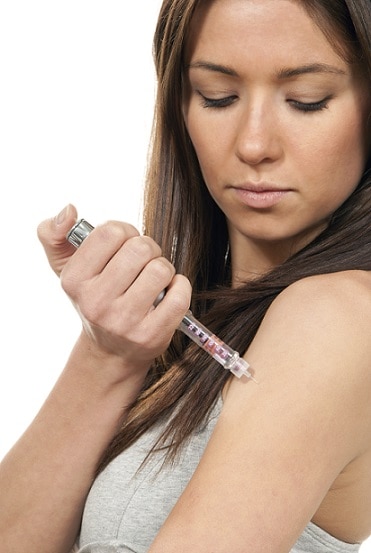 What if I told you that a single nutrient can enhance all of your acne-curing efforts?
What if I told you that a single nutrient can enhance all of your acne-curing efforts?
What if I told you that you’re almost certainly deficient in this nutrient? What if I told you that getting more of this acne nutrient is extremely easy, and is one of the best tools for clearing your acne full-stop?
The acne nutrient in question is vitamin D. Vitamin D isn’t a vitamin at all; it’s a steroidal hormone produced when your skin is exposed to sunlight. Mushroom, eggs and dairy contain vitamin D, but not enough to provide the full RDA.
Vitamin D is important for bone health and was traditionally just given to the elderly to prevent osteoporosis. But since 2000, there have been countless discoveries of its other health benefits – including clearing acne.
The shocking testimonials
Firstly, look at these tales of vitamin D’s effects on acne, sourced directly from internet forums on acne:
- Massive improvements in acne within 1 month; down to just two pimples.
- Very smooth skin within 2 weeks.
- Completely cured acne, after 20 years of endless topical acne treatments.
- Skin far tighter, smoother, and more normal-looking after 4 weeks.
- Complete elimination of “horrible cystic acne” from taking a vitamin D supplement after tests revealed dangerous low blood levels.
On acne.org, vitamin D has a user score of 4.1/5. Vitamin D is possibly the most far-reaching nutrient ever. Your body has 30,000 genes in total, and vitamin D affects nearly 3000 of them.
Vitamin D can improve seizure control in epileptics, relieve memory loss and confusion in Alzheimer’s patients, and protect against age-related macular degeneration, the leading cause of blindness. It’s even been found that pregnant women with adequate vitamin D levels are 400% less likely to require a C-section.
Read Annihilate Your Acne – get the ultimate diet for clear and glowing skin!
The best thing is that because vitamin D affects so many parts of the body, it can treat nearly every major condition behind acne.
The famous acne nutrient vitamin A mainly reduces your skin’s sebum production. With vitamin E you get massively strengthened skin against sunlight and air pollution.
Zinc is the greatest mineral for both calming down existing red and inflamed pimples, and preventing news ones from being born. Selenium increases your body’s production of glutathione.
Vitamin D, meanwhile, has a grand total of 3 standout powers (and countless more minor ones).
Factor 1 – improved insulin sensitivity
 Insulin is the worst hormone for acne. Not only does insulin stimulate your sebaceous glands to produce more oil directly, it can enhance the power of DHT and testosterone to do the same. Elevated insulin occurs when your energy stores become insulin resistant; when more insulin has to be produced by your pancreas to make them respond.
Insulin is the worst hormone for acne. Not only does insulin stimulate your sebaceous glands to produce more oil directly, it can enhance the power of DHT and testosterone to do the same. Elevated insulin occurs when your energy stores become insulin resistant; when more insulin has to be produced by your pancreas to make them respond.
It’s thus vital for all acne patients to improve the sensitivity of these stores to insulin, and vitamin D does that well:
STUDY ONE – this Californian study gathered 126 healthy subjects. Their levels of 25-hydroxyvitamin D and their insulin sensitivity were examined.
The scientists found a positive correlation between vitamin D and insulin sensitivity. A negative correlation was observed between vitamin D and blood glucose levels.
The scientists concluded that “subjects with hypervitaminosis D (severe deficiency) are at higher risk of insulin resistance”.
STUDY TWO – in this 2013 study, 100 patients with type 2 diabetes were recruited from the local diabetes clinic. The patients were 20-30 years old. Their serum insulin and vitamin D levels were measured, both at the beginning and end of the study. The patients were fed 50,000IU of oral vitamin D per week. 24% of the participants were vitamin D deficient.
Important article – the top 6 vitamins and minerals for clearing acne
After 8 weeks, insulin levels had fallen substantially. The scientists enthusiastically proclaimed vitamin D3 to effectively treat insulin resistance.
STUDY THREE – scientists in this 2011 study wanted to know whether elderly people at northern latitudes would have type 2 diabetes caused by vitamin D deficiency.
668 Faroese residents aged 70-74 had their vitamin D levels measured. Their medical histories and glucose levels were used to determine their diabetes status. To provide a fair comparison, the results were adjusted for BMI, serum HDL concentrations, smoking status, serum triglycerides, month of sampling, sex, and environmental chemical exposure.
Having vitamin D levels below 50nmol/ml doubled the risk of developing type 2 diabetes. The conclusion: “in elderly subjects, vitamin D sufficiency may provide protection against type 2 diabetes”.
FINAL STUDY – this review covered several studies and concluded that substantial evidence supports a relationship between vitamin D status and insulin sensitivity.
The benefits for diabetes patients are very promising for acne, because the disease is basically a super advanced form of insulin resistance.
According to the review above, vitamin D reduces the need for insulin by either enhancing the detection powers of glycogen stores, or improving the potency of insulin itself.
Factor 2 – relieved chronic inflammation
 Chronic inflammation is the root cause of acne. It’s when your immune system is overactive and pumps out far too many inflammatory cytokines like interleukin-6, interleukin-8, tumour necrosis factor-alpha (TNF-a), and so on. This barrage of chemicals bombards your p.acnes bacteria with a response that is unnecessarily vicious. In the collateral damage your pores redden, swell and become acne.
Chronic inflammation is the root cause of acne. It’s when your immune system is overactive and pumps out far too many inflammatory cytokines like interleukin-6, interleukin-8, tumour necrosis factor-alpha (TNF-a), and so on. This barrage of chemicals bombards your p.acnes bacteria with a response that is unnecessarily vicious. In the collateral damage your pores redden, swell and become acne.
In acne patients, chronic inflammation has two broad causes: 1) ingestion of too many inflammatory substances, and 2) poor nutrition that makes your immune system inherently over-the-top and poorly regulated.
Vitamin D works wonders for that second factor:
STUDY ONE – this 2013 study split healthy adults aged between 25 and 42 into vitamin D sufficient groups and vitamin D deficient groups. The scientists examined bloodstream levels of vitamin D, pro-inflammatory cytokines, and anti-inflammatory cytokines.
The anti-inflammatory cytokines, interleukin-10 and interleukin-5, did not vary between groups. However, the vitamin D deficient group had markedly higher levels of pro-inflammatory chemicals like interleukin-2, interleukin 1-beta, TNF-a, and interferon-y.
STUDY TWO – one particularly notorious chemical is NF-KappaB. This is a chemical messenger which regulates the production of many pro-inflammatory cytokines like TNF-a and IL-6. If you lessen the activity of NF-KappaB you can tune down the activity of virtually half your immune system.
Important article – the top 7 natural topical treatments for acne
Selenium’s large anti-inflammatory powers occur thanks to impaired NF-KappaB. This study found that in the inflamed tissues of asthma patients, vitamin D3 inhibited an over-expressed NF-KappaB, and therefore lowered overall inflammation significantly.
STUDY THREE – Scientists in this study examined the serum vitamin D3 and pro-inflammatory cytokine levels of 112 diabetic foot infection cases, and 109 diabetic controls.
The results were very interesting; there was a significant negative correlation between circulating levels of vitamin D3 and circulating levels of pro-inflammatory chemicals like interleukin-6 and interleukin 1-beta. The more severe the vitamin D deficiency, the worse the inflammation became. The study concluded that severe vitamin D deficiency is associated with elevated inflammatory cytokine concentrations.
What’s interesting is that a couple of studies find that vitamin D increases both TNF-a and IL-6. Vitamin D can also increase the response to influenza and other viruses.
Rather than rigidly tuning your immune system down, vitamin D regulates and brings its activity to the optimal level. Hence, it also brings acne to the optimal level – zero.
Factor 3 – increased antioxidant production
 Every acne patient needs antioxidants, to prevent blocked pores.
Every acne patient needs antioxidants, to prevent blocked pores.
Without antioxidant defences the sebum on your face reacts with sunlight, air pollution, or cigarette smoke and forms a comedogenic nightmare called squalene peroxide. Vitamin D helps you to manufacture your own antioxidants like glutathione and superoxide dismutase.
First of all, scientists in this recent 2014 study examined 693 apparently healthy adults from Atlanta, Georgia. 449 were female and 244 were male. Vitamin D levels were determined in the patients, as were glutathione, IL-6, IL-8, TNF-a and c-reactive protein.
Serum vitamin D levels correlated positively with glutathione, in a close relationship. That’s great news, because glutathione is the most abundant indigenous antioxidant. Studies find that acne patients have lower levels of glutathione in their blood and skin.
Secondly we have this study which was performed on 45 patients with atopic dermatitis, an inflammatory skin condition. Patients were divided into 4 groups: a) fake vitamin D and E supplements (placebos), b) 1600IU of vitamin D plus vitamin E placebo, c) 600IU of synthetic vitamin E plus vitamin D placebo, and d) 1600IU vitamin D plus 600IU vitamin E.
Blue light devices – can reduce acne by 67%, blackheads by 50%
After 10 days of supplementation, groups B, C, and D all enjoyed an increase in superoxide dismutase activity. SOD is the 2nd most abundant indigenous antioxidant and again, acne patients are often deficient.
What’s interesting is that dermatologists rarely step outside their comfort zone; for example, they’re avidly against any sun exposure to cure acne via increasing vitamin D.
However, they have stated that glutathione deficiency may be a root cause behind acne.
Increased antioxidant production might explain why vitamin D prevents 16 types of cancer. Antioxidants hoover up free radicals and free radicals love to weaken your cells’ structure and encourage them to mutate.
Factor 4 – endless other benefits
Vitamin D3 supplements have been demonstrated in studies to relieve depression. A happier mind means less stress, and less of the acne-causing hormone cortisol. Vitamin D works in tandem with vitamin A; both nutrients are critical for the other’s absorption. Vitamin A is the best acne nutrient for oily skin.
In 2000 scientists believed that vitamin D just kept your bones healthy, but now there are almost 34,000 studies showing other health benefits. New studies are flooding out every month and it’s highly likely that new benefits for your acne will emerge.
Read the eBook – learn why common vegetable oils are an acne nightmare
Vitamin D was about the 3rd supplement I ever took for curing acne, after reading glorious testimonials on internet acne boards. My diet was still loaded with sugar and other junk food behind acne at this point. I ignored the recommendations on the back of the box and took 5000IU per day.
The results were excellent. After a couple of weeks I noticed a vastly reduced acne count. I also noticed a glowing and radiant skin tone, which I attribute to increased antioxidant production. With free radicals being restrained, it’s harder for them to destabilise and weaken your skin cells. Free radicals are one big factor behind aging; that’s why cigarette smokers age so fast. Therefore not only will vitamin D reduce your acne, it could make you look younger too. These days I take 5000IU per day, both for acne and health.
Will vitamin D clear your acne?
The answer is almost certainly yes. Vitamin D has so many indirect benefits that the possibilities are endless. What makes vitamin D particularly promising for acne is that deficiency is so common:
- The Centre for Disease Control and Prevention (CDCP) found that 32% of US adults and children were defi vitamin D deficiency.The National Nutrition Examination Survey found that 70% of children aged between 6 and 11 were deficient or insufficient.
- Expert Dr Holick, who first discovered vitamin D3 back in the 1970s, estimates that 50% of the US population is at risk of deficiency.
What’s more, the figures are based on a recommended daily allowance that’s far too low in the first place. The old RDA of 400IU was only put together to prevent rickets. The Institute of Medicine recommends levels of 20ng/ml for healthy bones. But you need at least 30ng/ml for cancer prevention and healthy insulin levels, and 40-60ng/ml is the ideal for treating acne.
Zinc – the most powerful nutrient for red and inflamed acne
The Masai warriors in Africa spend half the day hunting animals on sunny plains, and they enjoy stable levels of 50ng/ml. Because your skin stops synthesising vitamin D when your blood has enough, this is clearly the optimal level. Like on the tropical island of Kitava, acne is almost unheard of in the Masai tribe.
Therefore, vitamin D deficiency is likely even more common. We get far less sunlight than we once did; we earn a living typing away in a dark office rather than building ships all day in a sunny dockland. Thanks to TV and videogames, families spend less time outside whether playing football in the park or having a picnic.
However, this is actually great news. Because you as an acne patient are likely to be deficient, you have massive scope for improving your acne with vitamin D3.
Your vitamin D strategy
You have two options: 1) get your vitamin D through sunlight or 2) take a supplement. Specifically it is the UV rays in sunlight your skin reacts to. Those rays are blocked by glass, so you have to be outside.
Moderately exposed white skin can manufacture 10,000IU in just 20 minutes, easily enough for one day. In typical clothes with arms, face, and maybe legs exposed, 40 minutes of sunlight per day is sufficient, so there’s little risk of sunburn, or actually inflaming your acne.
Your acne will melt away with sunlight if you live near the equator, where UV rays strike the Earth at less of an angle. Likewise, the lighter your skin, the more efficient your vitamin D production because melanin protects skin against UV light…
…but there are a lot of reasons why supplementation is a good idea. Anyone at high latitudes makes far less vitamin D per minute of sun exposure. Countries like the UK have cloudy and damp climates where the sun hardly ever shows up.
If you’re black or have dark skin, then it’s far harder to make vitamin D if you’re away from the equator. Maybe you do have a dark office job and don’t even have time for sunlight.
Why eating fish can lower acne by 42%
Furthermore, in the winter months the sun is so weak that in Scotland, you can’t make any vitamin D from the sun from mid-October to early March. The same is true for Russia, Canada, Scandinavia, and many high latitude places in the world. Your body can store vitamin D, but the stocks deplete rapidly. In the winter it’s nearly impossible to get enough vitamin D to kill acne from the sun alone.
Therefore, it is a terrific idea to take a high quality vitamin D3 supplement for acne. In fact, it’s absolutely critical for everyone with acne to take vitamin D3 in the winter, unless you’re camped out somewhere like Africa or Australia.
Depending on how dodgy the circumstances in your country are (bad weather, high latitude), it’s a great idea to take vitamin D for acne during the rest of the year too. Particularly the UK, Northern Germany and Poland, Finland, Iceland, Canada, Greenland, Norway, Southern Argentina and Chile, The Falkland Islands, Siberia, and New Zealand.
If you’re in those places then year round supplementation averaging around 3000IU a day is a smart decision. You can take as much as 10,000IU per day, but don’t go much higher since toxicity is possible.
Luckily, there’s no need to exceed 5000IU per day anyway. I’ve taken high doses in the past but I never noticed further benefits for acne. There seems to be wall of 5000IU per day, where afterwards further acne benefits drop off dramatically.
You also can’t overdose through sunlight, only supplementation. Your skin has a tightly regulated system that ends production of D3 once your bloodstream has enough.
Symptoms of vitamin D deficiency include…
- A low mood. People with the lowest vitamin D levels are 11 times more likely to be depressed.
- Muscle weakness.
- A sweaty head. A strange but notorious sign.
- Constant illness like flu and common colds. Vitamin D is needed for white blood cells to function efficiently.
- Acne.
Vitamin D supplements for acne patients
 Firstly, it is critical to take vitamin D3, not D2. Vitamin D3, known scientifically as 5-hydroxyvitamin D, is the actual form your skin manufactures when exposed to the sun. Vitamin D2, meanwhile, is a more obscure form responsible for less roles in the body.
Firstly, it is critical to take vitamin D3, not D2. Vitamin D3, known scientifically as 5-hydroxyvitamin D, is the actual form your skin manufactures when exposed to the sun. Vitamin D2, meanwhile, is a more obscure form responsible for less roles in the body.
According to one study, Vitamin D3 is 87% more effective at boosting blood levels of vitamin D2. A meta-analysis of 50 vitamin D trials found that while D3 cut the risk of death by 6%, D2 increased it by 2%. The two forms are equal for preventing rickets, but for improvements in all the conditions behind acne, vitamin D3 is vastly superior.
The reason? Both vitamin D2 and D3 must be converted to a biologically active form before they take effect, and the conversion of D3 is roughly 500% more efficient.
Why vitamin C is the acne nutrient you cannot ignore
Many acne patients have supplemented with vitamin D, mistakenly picked D2, and sat around wondering why it didn’t work. Don’t let that happen to you! Fortunately, supplement companies are now recognising the importance of D3 and are changing their products accordingly.
However, D2 is still found in the cheapest supplements. Remember that another name for D2 is ergocalciferol and another name for D3 is cholecalciferol.
Also critical is to get a supplement free from harsh additives. One such substance is magnesium stearate, which is used as a “flow agent” to prevent the contents of the supplement from sticking to the pill capsule. This helps factories to keep costs down, but does not make the supplement any healthier. Magnesium stearate has been linked to…
Vitamin C inhibition – one unpublished study found that adding just 1% magnesium stearate to a supplement, by volume, inhibited the activity of vitamin C by 65%. Vitamin C heals old acne by increasing collagen production.
Harsh additives – with magnesium stearate, you’ve got additives within additives because it commonly contains BPA, an acne-causing monstrosity. There’s also calcium hydroxide, considered toxic, and irganox-110, a potential developmental toxin.
Possible gut damage – magnesium stearate may stick to your gut lining and trigger an inflammatory response which weakens the intestinal wall. This can allow toxins to pass into the bloodstream and cause acne, and also inhibit the absorption of acne nutrients; that could be why the absorption of vitamin C was impaired.
Magnesium stearate is not a substance I recommend for acne, yet it is found in 90% of grocery store vitamin D supplements. That’s not all either; the predominant filler in the pills is corn starch, which is an utter monstrosity for acne patients.
Therefore, I do not recommend simply wandering into a supermarket and buying the first vitamin D pill on the shelf. There are two acne-friendly options. Firstly, if you have plenty of money then you can buy this natural supplement: NatureWise Vitamin D3 (amazon link).
NatureWise is easily among my favourite vitamin D brands. The vitamin D itself is natural and derived from lanolin, rather than test tubes in a laboratory. Most importantly, the vitamin D3 is encapsulated in extra virgin olive oil. Most supplements include a fat to enhance absorption, but cheaper brands use soybean oil or sunflower oil, two acne-causing oils with unhealthy fat profiles and swarms of free radicals due to being oxidised when exposed to harsh heat in factories.
Extra virgin olive oil, meanwhile, is stable, cold-pressed, and contains bonus vitamin E and antioxidants, as well as increasing the vitamin D’s absorption massively. NatureWise also has no other harsh additives, such as corn flour or magnesium stearate.
Your second option is this Fertile Moon Liquid Vitamin D3 (amazon link). If you’re low on cash, then this is superb because there are no additives and it takes literally one or two drops to supply your daily acne-clearing needs. A bottle of this will last forever; there are 600 servings.
Whichever supplement you choose will cure acne well; the NatureWise brand provides extra acne nutrition, but this gets the job done for a fraction of the price.
Vitamin D can nourish your entire body
 Follow those instructions and the improvement in your acne could shock you. It surprised me and it has shocked vast swathes of acne-prone people across the internet. The sheer number of genes it controls allows vitamin D to strengthen your body against many illnesses, not just acne:
Follow those instructions and the improvement in your acne could shock you. It surprised me and it has shocked vast swathes of acne-prone people across the internet. The sheer number of genes it controls allows vitamin D to strengthen your body against many illnesses, not just acne:
Autoimmune diseases. Vitamin D is a potent immune modulator; there’s evidence it can prevent autoimmune diseases like MS and Crohn’s disease. One study found that in countries closer to the equator, the risk for multiple sclerosis fell dramatically.
Patients with Inflammatory Bowel Disease generally have lower serum vitamin D levels than average. The immune system mast cells in your intestines and bowels are lined with vitamin D receptors, and by binding to them vitamin D can inhibit the release of inflammatory chemicals responsible for the symptoms of bloating, cramps, and abdominal pain.
Protection against influenza and viruses. The improved immune system efficiency also helps to prevent illnesses of all kinds. One Japanese study demonstrated that feeding 1,200 units of vitamin D per day to schoolchildren in the winter months slashed their risk of contracting the influenza A infection by roughly 40 percent.
Cardiovascular disease – if you have a heart attack and you’re vitamin D deficient, your risk of dying from that heart attack jumps up by 100 percent. Vitamin D levels determine your risk of hypertension, atherosclerotic heart disease, heart attack, and stroke.
Raw honey – a natural secret for wiping out acne bacteria
One study following 44592 men found that higher vitamin D intake was associated with a much lower risk of cardiovascular disease. Another study showed that vitamin D deficiency increased the risk of a heart attack by 50 percent.
Cancer prevention – possible the most astonishing of vitamin D’s benefits. According to one large-scale study, increasing vitamin D levels can slash the risk of cancer by up to 60 percent.
By keeping your levels optimized you can prevent at least 16 different types of cancer, including ovarian, prostate, pancreatic, lung, and skin cancers. Vitamin D can strenghten your defences against cancer by:
- Encouraging the self-destruction of mutated cells, which can replicate and create cancer.
- Inhibiting the multiplication and spread of cancer cells.
- Preventing the formation of new blood vessels from existing ones (which helps to inhibit the mutation of benign tumours into cancerous ones).
- Enhancing the differentiation of cells, a healthy process which cancer cells fail to undergo.
A 2007 study published in the American Journal of Preventive Medicine concluded that having a serum 25(OH)D level of over 33 ng/mL slashed the risk of colorectal cancer by 50 percent. What’s even better is that 33ng/mL is still too low itself. A Cochrane meta-review published in January 2014 concluded that just 55IU of vitamin D3 per day lowered the risk of cancer mortality by 15%.
Apparently there are over 200 studies demonstrating that vitamin D can cure cancer. Also, consider this: while vitamin D deficiency affects up to 50% of Americans today, cancer is now diagnosed in more patients under the age of 30 than ever before.
Conclusion
If you could only take one supplement for acne, then I’d have to recommend vitamin D. Zinc can be obtained with clever rearranging of your diet, and you can get vitamin E from megadosing almonds. There are many great sources of vitamin C; people just don’t eat as much broccoli or kale as they did.
Therefore, vitamin D is the supplement most deserving of your cash. It’s not guaranteed to work, but thousands of acne patients have enjoyed phenomenal results.
Just cast your mind to a prisoner or any other person who rarely sees sunlight. One of the first things you’ll notice is large bags under their eyes, a pasty skin colour, and that their skin generally looks very unhealthy indeed.
Vitamin D can both crush your acne and improve the general tone of your skin. You won’t get instant reductions in acne because it takes a few weeks for blood levels to build up, so don’t lose patience and switch to another supplement.
When the benefits of vitamin D finally do kick in, the improvement in acne will almost certainly be worth the wait.
NEXT: learn the root causes of acne, clear your skin permanently
Thanks for reading!